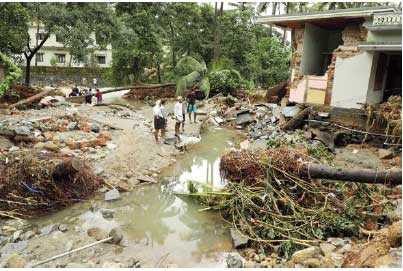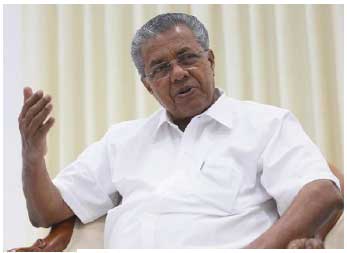Looking beyond human tragedies
 A house destroyed by floodWe still hear the echo of Kerala’s
massive tragedy in the wake of
Nature’s Fury in Kerala in August
2018. Why could Nature be so
furious and unkind to the people of
“God’s own country”? The same
agonizing question could be raised with regard to the recent
repeat of the 2013 human tragedy in India’s “Devbhoomi” of
Gangotri, Joshimath, Badrinath, Kedarnath and Pindari
Glacier and tourist centres of the Himalayas in Himachal
Pradesh.
A house destroyed by floodWe still hear the echo of Kerala’s
massive tragedy in the wake of
Nature’s Fury in Kerala in August
2018. Why could Nature be so
furious and unkind to the people of
“God’s own country”? The same
agonizing question could be raised with regard to the recent
repeat of the 2013 human tragedy in India’s “Devbhoomi” of
Gangotri, Joshimath, Badrinath, Kedarnath and Pindari
Glacier and tourist centres of the Himalayas in Himachal
Pradesh.
An equally pertinent issue amidst the massive calamity is
to talk about the quality of the leadership at the Central,
State and operational levels. I do not wish to see this
through the prism of colours, whether white, green, red or
saffron etc. As a journalist, I see our leaders on the
touchstone of their understanding of the complexities of
each situation and their response to the suffering people.
This is where my disappointment begins.
I see our leaders on the
touchstone of their
understanding of the
complexities of each
situation and their
response to the heartthrobs
of the suffering
people. This is where
my disappointment
begins.
 Pinarayi Vijayan
Of course, there could be variation in every individual
quality, from the Left to the Right. I am not going into their
merits and demerits. My concern is: why this Nature’s Fury
and where have we gone wrong while playing with Nature in
policies, planning, development and governance?
My wider question is: in a federal democratic system of
ours why should our Central leaders conduct themselves as
Mai Baap and Anna-Datta like the Maharajas of
yesteryears? The job of assessing a calamity ought to be left
to an experts’ panel along with a joint parliamentary
committee while ad hoc assistance and grants could be
given promptly by the Central Authority. This is what
democratic governance is all about.
Pinarayi Vijayan
Of course, there could be variation in every individual
quality, from the Left to the Right. I am not going into their
merits and demerits. My concern is: why this Nature’s Fury
and where have we gone wrong while playing with Nature in
policies, planning, development and governance?
My wider question is: in a federal democratic system of
ours why should our Central leaders conduct themselves as
Mai Baap and Anna-Datta like the Maharajas of
yesteryears? The job of assessing a calamity ought to be left
to an experts’ panel along with a joint parliamentary
committee while ad hoc assistance and grants could be
given promptly by the Central Authority. This is what
democratic governance is all about.
Be that as it may. The only silver lining in an otherwise
gloomy setting in “God’s own country”, Char Dham and
other flood affected states is the heroic efforts of soldiers of
the mountain division, paratroopers, Navy and IAF’s rescue
operations, National Disaster Management Authority
(NDMA) persons and volunteer fishermen with a fleet of
about 600 boats to rescue villagers in Kerala
We also must acknowledge the people’s response all
over India to extend their helping hands voluntarily to
the millions of Kerala people who have suffered the
worst floods in a century. The state government
estimates a loss of Rs 20,000 crore. The Centre’s grant of
Rs 7,00 crore for the massive task ahead is far from
adequate. What is disquieting is the play of politics in
this unprecedented human tragedy.
There is a daunting task ahead in controlling multidimensional
diseases and related health issues. The NDMA
officials have moved forth with 3 R approach – Rescue, Recoup and Rehabilitation.
Kerala Chief Minister Pinarayi
Vijayan has already sounded a
call for a “New Kerala”. But
constructing a new Kerala is a
gigantic task. It cannot work
unless we learn from the past
mistakes. For the present, the
main challenge is management
of pre and post floods solid
waste. These are matters of
details, best known to experts.
To quote an expert: “Just
development of big storage
dams may not help. When it
rains heavily, the dam gates are
opened which leads to excessive
flooding. Instead, “we need to
work on flood management,
which basically means
removing encroachments from
traditional water flow zones and
allowing excess water to flow
smoothly into the ocean.
According to the Central
Water Commission (CWC), the
floods are responsible for
deaths of 84 per cent of people
in all natural disasters in India”.
Former CWC chairperson A B
Pandya says in his study that
there is a need for effective pre
and post-disaster mechanism as
“nature cannot be checked but
disaster can be reduced” in its
impact on the life and the
economy.
In a federal democratic
system of ours why
should our Central
leaders conduct
themselves as Mai
Baap and Anna-Datta
like the Maharajas of
yesteryears? The job of
assessing a calamity
ought to be left to an
experts’ panel along
with a joint
parliamentary
committee while ad
hoc assistance and
grants could be given
promptly by the
Central Authority. This
is what democratic
governance is all
about.
The World Wildlife states:
“We are losing 18.7 million
acres of forests annually,
equivalent to 27 soccer fields
every minute”. It must be
remembered that the forests
play a vital role in controlling
climate change. The WWF
suggests that 15 per cent of all
green house gas emissions are
results of deforestation.
However, the moot point is:
who will tackle the
deforestation mafia gangs
generally working in close
collaboration with politicobureaucratic
patrons?
 Euripides
Floods, landslides and
alarming degradation of the environment have continued
decades after decades because
our politicians have allowed
“unbridled quarrying, mining,
building of high-rise dams and
constructions and power
plants”.
Euripides
Floods, landslides and
alarming degradation of the environment have continued
decades after decades because
our politicians have allowed
“unbridled quarrying, mining,
building of high-rise dams and
constructions and power
plants”.
What is equally regrettable
is a number of studies on
ecological disasters
conducted by experts
languish in several corners of
the establishments without
any concern and follow-up
actions.
No wonder, disasters come
and go. What else can we expect
in today’s “democratic
environment” of India when the
sole mantra of large sections of
persons at the helm and their
collaborators is:
“Takka Dharm
Takka Karma,
Takka hi takk takkayate”.
That is, making money (Takka)
is both dharma and karma in
today’s money-oriented society.
Finally, I would quote a
tragedian of classical Athens
Euripides who said so
succinctly:
“Who rightly with necessity
compiles
In things divine we count
him skilled and wise”.
It is a pity that our rulers in
their intoxication with power
often overlook human
tragedies.
Well, we will have to
challenge the near non-working
status-quo of new development
concepts and perspectives so as
to avoid a repeat of the tragedies
in Kerala and the holy
Himalayan region.
This should not be difficult in
today’s ‘informatics’ society,
provided information itself is
not contorted and twisted by
the vested interests of the
powers-that-be. Both Kerala
and ‘Devbhoomi’ deserve
better deals, Prime Minister
Narendra Modi.




 A house destroyed by flood
A house destroyed by flood Pinarayi Vijayan
Pinarayi Vijayan Euripides
Euripides